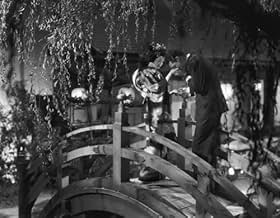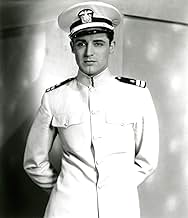Lieutenant Pinkerton marries geisha-in-training but soon after abandons her and goes back to the US.Lieutenant Pinkerton marries geisha-in-training but soon after abandons her and goes back to the US.Lieutenant Pinkerton marries geisha-in-training but soon after abandons her and goes back to the US.
- Awards
- 1 win total
- Bridesmaid
- (uncredited)
Featured reviews
Sylvia Suffers in Fancy Dress
Those outraged at the casting of a Jewish/American actress as a geisha should also take note of the fact that All-American cad Pinkerton is played by a Bristolian.
Lucky Find
Sylvia Sydney is incredible. She's more convincing as the embodiment of Cho Cho San, than most actors of the era, who seemed largely to be playing as if to audience than camera. (Not that I'm knocking it, the 30s and silent are my favs. Just sayin'. Psst it's the scenes and costumes. Moving Art.)
This version of Madame Butterfly absolutely worthwhile! If for the performance of Sydney and her costumes alone. Okay, and Grant's pretty face. One warning for opera lovers though: Other reviews point to Puccini's "incidental" music throughout. I may be wrong, but I only heard the overture at the opening credits and the main aria at the end. Everything in the middle not Puccini as far as I can tell. I say, still worth it.
Very well made but dated.
The story is based on the David Belasco play which was then made into a Puccini opera by the same name. The film, however, is not an opera though some of the music from the opera is included as incidental music.
Lt. Pinkerton (Cary Grant) goes out on the town with his navy pal, Lt. Barton (Charlie Ruggles). Soon Pinkerton meets Cho-Cho San (Sylvia Sidney) and he's smitten with her. But he's informed that he cannot date her or spend time with this geisha. Barton sees a loophole and suggests Pinkerton marry her....and then dump her when his ship leaves. She doesn't realize that Pinkerton is a dirty dog and they are married. Soon after the wedding, Pinkerton leaves....and Cho-Cho waits several years for him to return. In the meantime, she's had his child...a child who he doesn't know he has. Later, Pinkerton returns to Japan....with his new American wife!! What's next? Well, it's best I don't spoil it...see the film.
The story is lovingly made and looks great...and it's also quite moving. It is such a darn shame, then, that the casting decisions were so stupid....fine for 1932 but still stupid when you see it today. Part of this problem isn't just because such casting seems racist. It's also that folks in 2020 know a lot more about Japanese culture and know that what they are being given here is less Japan....and a lot more Puccini and Belasco.
Overall, a very good film version but one that begs to be remade. And, I have to knock off a point for Grant's singing...it's among the worst I've ever heard by an actor...even worse than Lee Marvin's singing in "Paint Your Wagon" but thankfully Grant's is confined to only one terrible song....and it's not a musical with multiple numbers!
Good adaptation of the well-known story; would love to see on video
The luminous Sylvia Sydney takes a significant gamble in attempting to play the young Japanese girl Cho-Cho San (in fact, such casting would undoubtedly be seen as politically incorrect today), however, the Bronx-born actress is more than up to the challenge and delivers quite a totally convincing performance. The character of Cho-Cho is so incredibly passive and naïve that she often comes dangerously close to becoming an artificial caricature, yet Sydney portrays the role with such genuine pathos and non-cloying sweetness that she comes across as tragic rather than foolish. Her accent also always sounds credible, and she even manages to believably look Japanese with the assist of limited stage makeup. I was terribly impressed wither her overall performance.
A young Cary Grant ably plays the object of Cho-Cho's tragic love, and he looks breathtakingly handsome in his Navy uniform. The bulk of the movie consists of Sydney and Grant playing off one another, although Charles Ruggles is likable as Grant's fellow Lieutenant. Perhaps the biggest surprise is that Shelia Terry's "other woman" character is portrayed as being sympathetic and understanding, when she would have surely been written and acted as a one-dimensional monster by most filmmakers of the era. None of the characters in the "Japanese" supporting cast (nearly all of whom are American-born actors playing Japanese) are fleshed out enough to stand out, although Edmund Breese is convincing as Cho-Cho's stereotypically disapproving grandfather.
If the film has a primary shortcoming, it is that the entire premise feels a little flat when performed as a straight drama. Although it is well-written and reasonably paced, the drama simply does not soar to the appropriate level of intensity without the accompanying swell of the opera. There is still much to recommend, however, in this very touching picture, primarily the terrific performance of Sydney, which is worth watching totally on its own merit. I really do wish this film would be properly released on home video, as it deserves to be seen.
a tragic romantic story
Did you know
- TriviaThe Japanese censor cut a scene where Cary Grant and Sylvia Sidney share an embrace, because Miss Sidney's elbow was exposed.
- GoofsWhen the US Navy returns to Tokyo Bay/Yokohama, mountains are seen rising from the sea. There are no mountains in that area.
- Quotes
Cho-Cho San: Do not weep, Mama-san.
Cho-Cho's mother: But you are so young and never have you been away from home before.
Cho-Cho San: But consider Mama-san, soon I shall be very great geisha and then you and the august grandfather and the little brother will have much money.
Cho-Cho's grandfather: This is no place for the daughter of my son, the daughter of a noble samurai. I should never have consented to your coming here.
Cho-Cho San: But we must live and I'm the only one who can work and help.
Cho-Cho's grandfather: Your father died with honour when he could no longer live with honour.
Cho-Cho San: Is it then so shameful to make people happy? To sing for them, to make music, and dance? And I may make a fine marriage. Then I can buy you many gifts
- ConnectionsReferenced in Jeopardy!: Episode #1.2 (1984)
- How long is Madame Butterfly?Powered by Alexa
Details
- Runtime
- 1h 26m(86 min)
- Color
- Aspect ratio
- 1.37 : 1



































